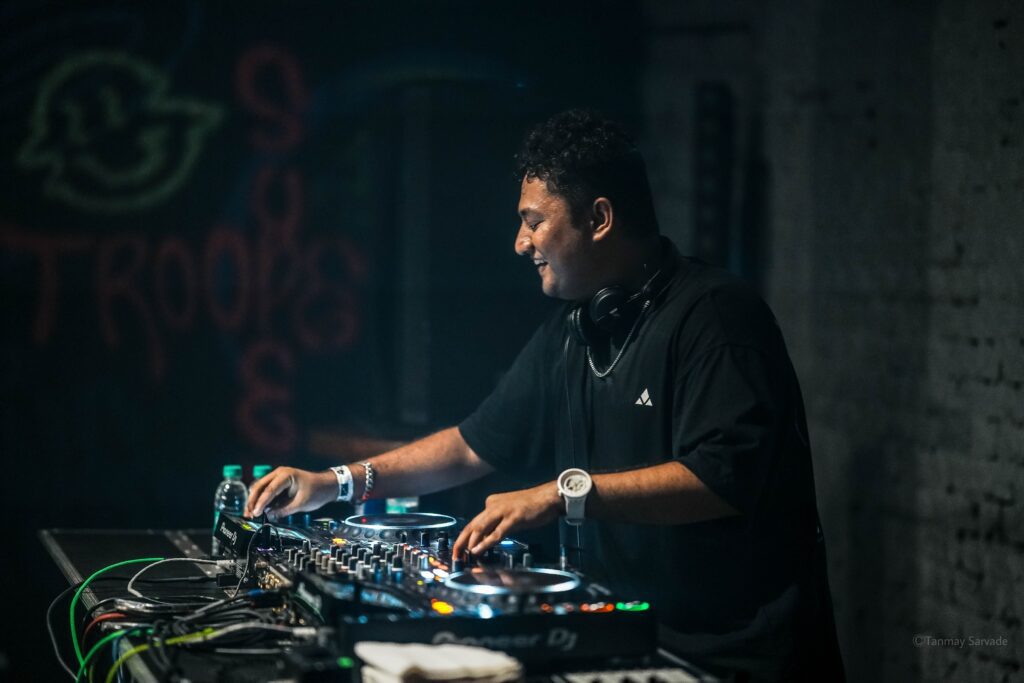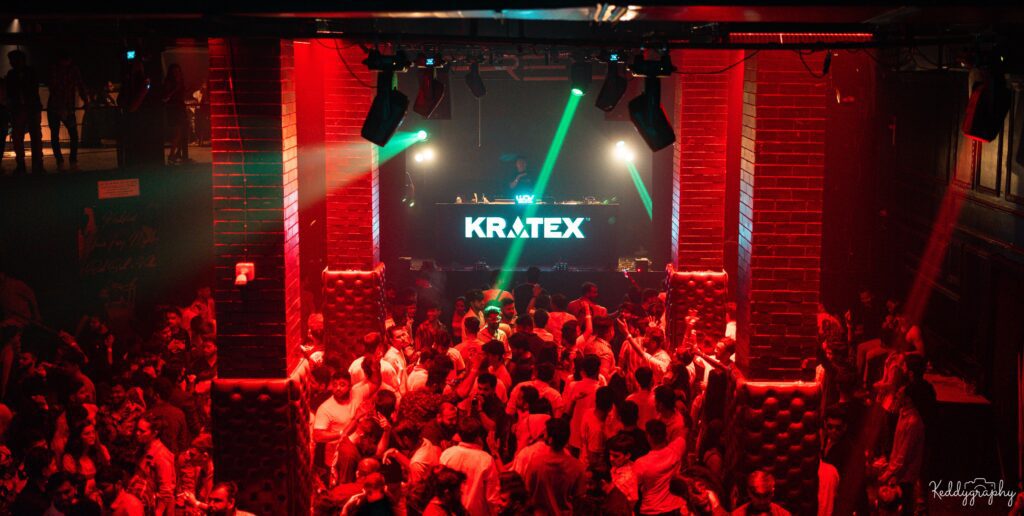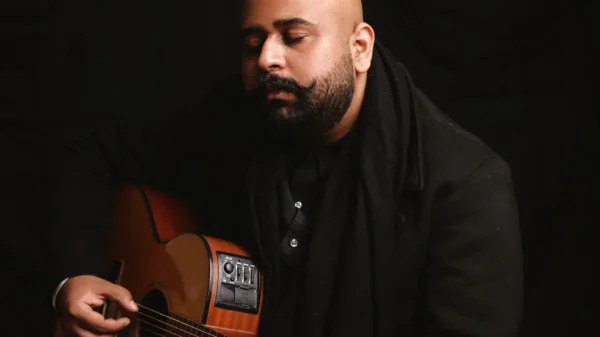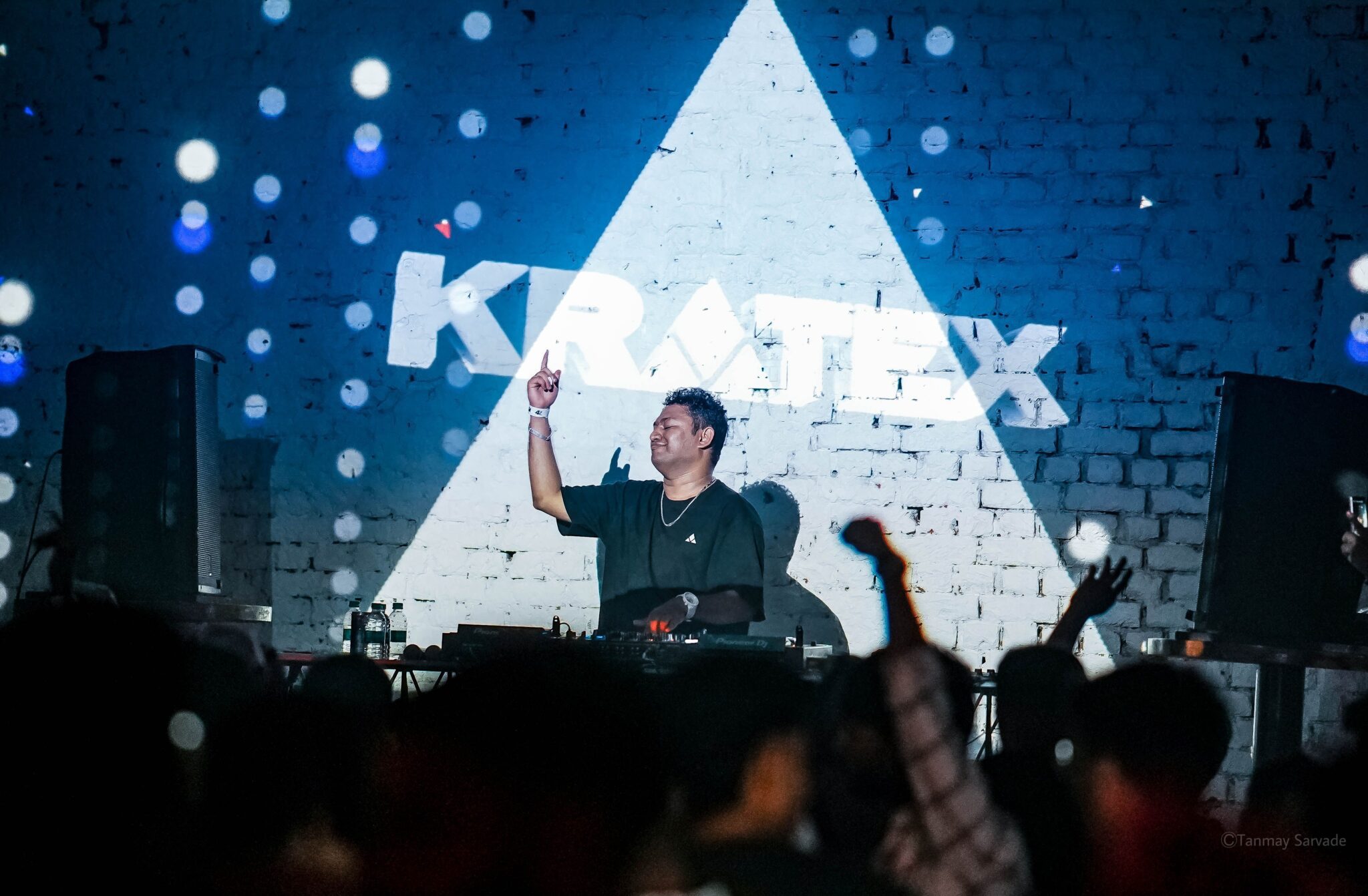If you live in Maharashtra, and enjoy some form of EDM — you must have heard of Kratex. If you live elsewhere, you must have heard of Taambdi Chaamdi. The designer turned DJ besides having a record-breaking collaboration with Shreyas, has also propelled an entire sub-genre to incredible fame. Marathi house music, or what he charismatically calls “M-House”, has layering of Marathi numbers with house beats creating incredible concoctions of music that is catchy, danceable, and blast-worthy at any celebratory occasion. In an interview conducted over video call, Kratex, or Krunal Ghorpade, talks about the origins of his musicality, his style of creation, how he picks his collaborators, gaming and everything in between and beyond.
What made you pick Kratex as your name?
I get this question a lot. There is no actual deep meaning behind this. The only reason I took this name was because I needed a unique name to release your music. I initially went by DJ Crush, but that name was already taken. So, that’s the only reason – and I wanted to have an X at the end – which is what made me pick up Kratex.
When did you start making music?
My first release was around 2015. I started making music when I was in my first year of engineering. I started on Virtual DJ, where it would be something like putting two tracks together. Later, my friends told me that there was something called FL Studio where you could make your own music. Music courses were very expensive, so I learned everything on YouTube. But YouTube videos on subjects like this weren’t that big either. So my primary sources were some YouTube tutorials, and some blogs where they used to write step-by-step instructions on how to make music using these softwares.

My phone was like one of those normal Nokia phones where you could save the webpages. An Internet connection was not that cheap either, back in the day. I used to buy 10-20 mbs a week. I needed to use it efficiently, and this is how I started learning. It took me 2 years for my first release. At that time, it wasn’t all perfect – the tracks were average sounding ones.
Did you know that you wanted to make music right from the start?
No, In school I wanted to develop games – I was more of a techie, which I am right now. I wanted to create games because I was fascinated by them, not because I used to play them a lot. I didn’t get too many games – but when I went to friends’ houses, I saw computer games and was amazed by them. I used to check out game websites, and which games became big in the news. I wanted to do that.
In college, when I was exploring softwares, because as a techie that is your life — I came across Virtual DJ, and then I found out about DJ-ing. While I was Googling a lot, I found this documentary on David Guetta – which depicted his entire journey, what struggles he went through, and how he became a DJ – and that was really inspiring for me. I had heard some of David Guetta’s music, and I always used to be fascinated with the kind of sounds he used to create. I didn’t know what electronic music is – I just heard this different type of music, and then I watched the documentary, and listened to the album of the same name, Nothing But the Beat. That was when things clicked for me, and I realized that this is what I wanted to do — I wanted to become a DJ, and work for my whole life over this.
Do you come from a musical background — had anybody within your family been musicians?
Not at all, but my Dad was a very avid listener. He was also a tech guy, not a computer tech guy, but he liked having all the latest equipment related to entertainment at home. A good TV, a good music system – we used to live in a chawl back in the day, and my house was the only house that had a music system, which was a very new thing then. I also had a walkman – it was a thing, but no one else had it in the chawl. So, hearing a lot of music was a thing. It was also that my Dad did not listen to a similar, singular genre of music — he used to listen to all different styles. He used to listen to Wham!, Michael Jackson, sometimes he would play songs like Walk Like An Egyptian — and at the same time, we had qawaalis, Bollywood, regional songs etc. When he passed in around 2004, his music was the only thing that I had – the CDs, and cassettes. Music was the only thing I had, and I used to listen to all that music on the walkman or the music player. So listening to different kinds of music was something I had in my family. However, there has been nothing related to music in my family as such, I think the last ten generations have not been involved with anything related to music making.
When did you start performing / doing shows?
When I started in 2012, I just loved DJ-ing. I started live performances, but you wouldn’t call them shows. These were local events — where at Garbas, there would be DJs, or private parties when a DJ friend would call me over. My first initial proper shows started in 2015-16, when I had a few releases. These were good shows, with my face on the flyers but these were very few in number. Until 2022, I wasn’t doing a lot of shows. Before this whole Marathi thing, I was just doing one show a month. I never did full-time DJ-ing either, I was never a resident DJ. I had a job, I am a designer. So I always thought that if I wanted to play my music, I would play my kind of music.

I was a UX designer for 8 years. I did pretty well, I became a Design head of a company at some point. I loved designing, from video games, and I had a knack for designing. The only number of shows I’m doing is after M-House, when I started doing Marathi music.
What would you say about the Mumbai DJ / electronic music scene? Is it welcoming?
As I said, I don’t come from a background where I did shows regularly. From the little information I have, before M-house, I used to go to a few shows on my own. I never felt inspired – this is my personal opinion. I never felt that I should talk to this person, or become like him. Whoever it is in my Mumbai — I never felt anything to get inspired from this. The only Indian guy I got inspired by was Nucleya, because he was creating a very good scene, he wasn’t just doing shows in Mumbai, he was doing them across India.
I don’t think the question is whether they are welcoming or not, because there is no scene. One can only say that there is a scene when a lot of good music producers and artists exist. For example hip-hop is a scene in Mumbai and India because there are a lot of good rappers who make their own music and have their strong fanbases. DJs have nothing, even the top billing ones have around 1000 listeners on Spotify,
Do you think with the arrival of Boiler Room prototypes — there would be more expansion or changes to the scene?
See boiler rooms have nothing to do with playing original music or growing the original music artists. They have DJs —, who are of two types : the ones who download music and play it, and the ones who make their music and play it, like Nucleya. Apart from Nucleya, there are two or three people I can count with my fingers who are doing this. Boiler rooms will not do that much, I think. Boiler rooms have happened 2-3 times in Mumbai, and this will help in building a DJ and party/clubbing scene. People are going to see Mumbai as a clubbing destination. The people I have seen at Boiler Rooms, besides 1-2 people, have no music at all. The only thing that can change the electronic music scene is the entry of festivals in India. Like I know that Ultra did not do very well when it happened in India, when these festivals happen to do well, then the scene will grow.
When did you realize you wanted to make house music?
Earlier, I used to make whatever was popular. But in 2018, one decision I took was to go to Amsterdam on a solo trip to check out what was going on in the world. I went there, I exhausted all my savings, and that time, after my trip I gravitated to house music because I learned a lot about it. I also learned that house music is the origin of all electronic music – everything has evolved from it. I started listening to a lot of classic house tracks. One of the main reasons for making house music was David Guetta’s music. I had heard his music before, but I did not know they were house music tracks. He is making it more commercial, sure, but I heard classic house tracks like Move Your Body – and I felt like I was in love with it. Then I had this realization, that these things that are not working out, whatever I am doing — let us not make music for the audience. House music is not popular even today. So, I decided to stop pleasing audiences. Pleasing audiences was giving me nothing, it was barely giving me 2-3 shows which were not paying me.
That changed everything. I used to get good feedback when I put out music and sent it to VJs in the form of demos. Then I realized that I had found something that I really loved. That was when I realized that I wanted to make house music.
What does your process of music making look like?
House music has a fundamental beat to itself— two house tracks will have a really similar sound, but the nuances of difference are only felt, not heard. The feeling comes from the bass and the kick. If that itself is not making me dance, then I don’t care what the track is. So I start with the bass and then I start building the drums – I make a house track first, then I start elements to it. That is how I started making M-House music — I started putting Marathi music inside it. I have heard a lot of people do it differently, but this is how I do things. I want house music to remain house music, the whole purpose of the genre is to make people dance. It does not matter how good the melody is.
Once I get that knack – when I have a 30 second loop, the track is made inside my head. This process of the first 20-30 minutes of me deciding whether I like the track – is very crucial for me.
You mentioned video games before. What are some games that have influenced your music making – any soundtrack that has inspired you?
That is an interesting question. Games – my favorite personally was GTA. GTA always had a radio inside when you played. All the tracks inside the radio were really inspiring for me. I used to take a car and ride inside the game to listen to the full songs. I used to listen to a lot of the earlier FIFA soundtracks. The soundtrack of Max Payne, too, inspired me a lot.
Do you want to soundtrack games in the future?
Yeah, definitely! Actually I did do something when the GTA trailer dropped. Nowadays with AI, you can extract the song out of the trailer and keep it with just the vocals on it. I removed the soundtrack which was on the GTA trailer and made it mine. I made a Marathi house track and layered it on top. I also properly scored the dialogues. I do that a lot – when I play a trailer, and I get the vibe of the game. I really want to do something like that in the future.
When did you start working with Marathi music?
Marathi music started 1 and a half years ago. It was not a conscious decision – I was making a lot of tracks but nothing was happening. However, I was doing well in my design career. One of my old friends, who is in the merchant navy, met me. He is not that accessible as a person because he only comes sometimes. He asked me if I had given up on music out of concern. That hit me, and I felt that I had become a loser, I had quit music. I was not posting anything about music, there was nothing of me outside. So I decided to put out some content on Instagram just so that the world knew that I was making music – the small world where 5-6 thousand people follow me.
I was wondering what I should put out, because I was not doing shows then. I was making music everyday, so I decided to record that and post it. By fluke, I chose a Marathi sample and labelled it as Marathi House. People liked it, and I kept doing it week after week. It reaffirmed to me that I am not a loser, and my friends knew that I had not just given up on music. The sixth track in this series was Mamachya Gavala’s remix, which went viral. After that, I decided to keep doing it – because I was loving it and people were loving it. What was important to me, was that I was loving it.
You have had such a successful collaboration with Shreyas, and you are in the constant process of working with other artists. How do you approach collaboration in general?
I totally trust my instinct on that. This is a learning I have had from Taambdi Chaamdi’s success. With that song, I just wanted to make something with Shreyas because I liked his vibe. I really liked working with him — we had made one other track, which was essentially jamming. When Taambdi Chaamdi became what it is, I thought that this is how I shall approach collaborations. I realized that I don’t want to make a hit, I just want to make songs. I have also realized for now, I want to collaborate with a lot of different people. I don’t want to make an album now, I don’t want to make one where I don’t feel like it out of compulsion.
How did the collaboration with Shreyas come about?
While I was putting out Marathi remixes on Instagram, a lot of Shreyas’ fans texted me asking me to collaborate with him or remix some of his music. That is when I discovered him, and I really loved a track of his – Paristhiti. His voice is also really unique. I was doing a small bootcamp, where I bring artists together and force them to collaborate – and I wanted to do something with him. I really connected with him at that time, because I also got a similar energy from him – he also really wants to make something.
Sonically, how did Taambdi Chaamdi come about? Did the beats come first or the lyrics?
The beat for Taambdi Chaamdi was not even made for Shreyas. I was approached by a Malayali actor who also raps. He told me he wants to do something in Marathi, but for some reason he got a movie and was busy. I thought that while he was busy, I could send it to Shreyas and he could write a verse for it. I thought it would be a very interesting collaboration.
Shreyas sent me the verse and the hook, and he told me to keep or remove whatever he wanted. I heard what he sent, and this was the final version that was released later. He wrote a few lines later – but we did not release it right then. He started playing it in his shows, and I in mine, and we both got good responses. Then we decided to call this our track, and the other guy also said that since he was busy, we could go ahead with that. Fun fact, this track is very popular with Malayali people.
Speaking of varied audiences, how did the USA tour happen?
I texted one of the company’s representatives, about the fact that I was doing Marathi house music – and they told me that their schedule for 2024 was completely locked, but they could do something in 2025. This was in the initial stages of Taambdi Chaamdi taking off. Later, we decided to name the tour after the song. This was a collective decision to name the tour after the best thing.
I was always getting texts from the fans outside India – I was checking the streaming numbers, and the second country with the most listeners was the US. Before this, I had done the Australia tour, however, it is not as immersed in DJing as a culture when it comes to the US.
How did Jevlis Ka come about?
Jevlis Ka, in Marathi is now very popular on the Internet as a slang. It is asked in a romantic, flirtatious way, though. Because it is very popular, we made a song about that. Feni and I met in an interesting way. Shreyas was performing Taambdi Chaamdi, and he used to put people’s reactions to the song on his stories. One of the stories had a girl abusing and shouting about the song — she was so happy. That story I really liked, and I reposted. I just wondered who that girl is — and I assumed it was someone else on her profile, because she seemed like a really classy kind of woman.
However, later, I was doing a show, and she came there. She told me that in the story I had reposted, she was the one swearing and shouting. So I was surprised and I asked her if she spoke Marathi, and she said yes. At that time, someone said “jevlis Ka”. So that is when I thought, what if an NRI girl says Jevlis Ka? And that was BhaDiPa’s party — BhaDiPa is a famous Marathi YouTube channel, and I was playing at their anniversary party. One of their co-founders is a foreigner, she is a Canadian. Her videos of speaking Marathi are also very viral. That is when it clicked for me.
She told me that she had never done a song in Marathi, once I gave her the idea after seeing she had rapped a bit in the past. I replied that I would give her the hook, I will tell you the words inside. The rest she could do in whatever language she wanted. Then she went to Goa, and she sent me a draft. That is when I knew that it was done, I knew it was going to go crazy although she did not believe me initially.
Are there more people you would like to collaborate with in the future?
Yeah definitely. David Guetta is one of them. Ajay Atul – they are the ones who have elevated the taste of Marathi music in modern times. It is a big privilege to have such artists in the community where you are also trying to make it.
Kratex’s new tracks — Jevlis Ka, and Zapuk Zupuk are streaming on all platforms.





























